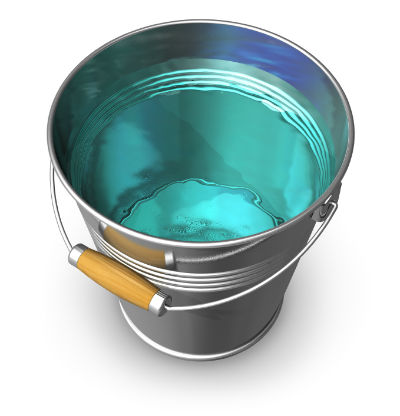 Blog Action Day, a yearly event for bloggers to spread awareness of important global issues, is concentrating on the topic of Water in 2010. 1-800-RECYCLING.com is proud to participate in its second Blog Action Day, focusing on water reuse and conservation issues.
Blog Action Day, a yearly event for bloggers to spread awareness of important global issues, is concentrating on the topic of Water in 2010. 1-800-RECYCLING.com is proud to participate in its second Blog Action Day, focusing on water reuse and conservation issues.
The idea of collecting greywater from common household activities such as bathing and washing dishes might seem overwhelming, but it’s not any more difficult than accumulating rainwater in barrels. Once you have the collection system set up, saving greywater will become just another part of your eco-friendly routine along with your recycling and composting habits.
Did you know that for every two minutes that you run water, an estimated
5 gallons goes down the drain? When you think about all the times you use water in one day, this number adds up quickly. To increase your water conservation efforts, below are simple ways to collect greywater in your home.
- Store a bucket in or outside of your shower. While the water is warming up, you can use the bucket to catch the clean water. You can also keep the pail in the shower while you bathe.
- Wash your hands and rinse fruits and vegetables over a bowl. Or, better yet, fill a bowl of water first and then do your rinsing and washing so you don’t have to run the spigot.
- Pour unused drinking water into a bucket instead of sending it down the drain. Or, reuse the water right away by hydrating your indoor or outdoor potted plants.
- Divert rinse water from your washing machine into your garden. This can be accomplished by using a T-valve and additional piping to your back yard. However, you have to be more cautious of the types of detergents you purchase. Many detergents contain salts and other toxins that will deteriorate the quality of the soil and potentially kill plants.
Taking the time to collect greywater can save you money on utility bills, and it reduces the amount of wastewater your household creates. However, with greywater collection, there are some
safety concerns to be aware of. For example, you don’t want to use greywater on edible plants or reuse water that has been contaminated with fecal matter, bacteria or chemicals. But, by watching the products you use in your home (e.g., detergents and cleaning products), you will be able to reuse more greywater and conserve a precious resource.
For more information on water issues, visit the Blog Action Day website.
 Blog Action Day, a yearly event for bloggers to spread awareness of important global issues, is concentrating on the topic of Water in 2010. 1-800-RECYCLING.com is proud to participate in its second Blog Action Day, focusing on water reuse and conservation issues.
The idea of collecting greywater from common household activities such as bathing and washing dishes might seem overwhelming, but it’s not any more difficult than accumulating rainwater in barrels. Once you have the collection system set up, saving greywater will become just another part of your eco-friendly routine along with your recycling and composting habits.
Did you know that for every two minutes that you run water, an estimated 5 gallons goes down the drain? When you think about all the times you use water in one day, this number adds up quickly. To increase your water conservation efforts, below are simple ways to collect greywater in your home.
Blog Action Day, a yearly event for bloggers to spread awareness of important global issues, is concentrating on the topic of Water in 2010. 1-800-RECYCLING.com is proud to participate in its second Blog Action Day, focusing on water reuse and conservation issues.
The idea of collecting greywater from common household activities such as bathing and washing dishes might seem overwhelming, but it’s not any more difficult than accumulating rainwater in barrels. Once you have the collection system set up, saving greywater will become just another part of your eco-friendly routine along with your recycling and composting habits.
Did you know that for every two minutes that you run water, an estimated 5 gallons goes down the drain? When you think about all the times you use water in one day, this number adds up quickly. To increase your water conservation efforts, below are simple ways to collect greywater in your home.